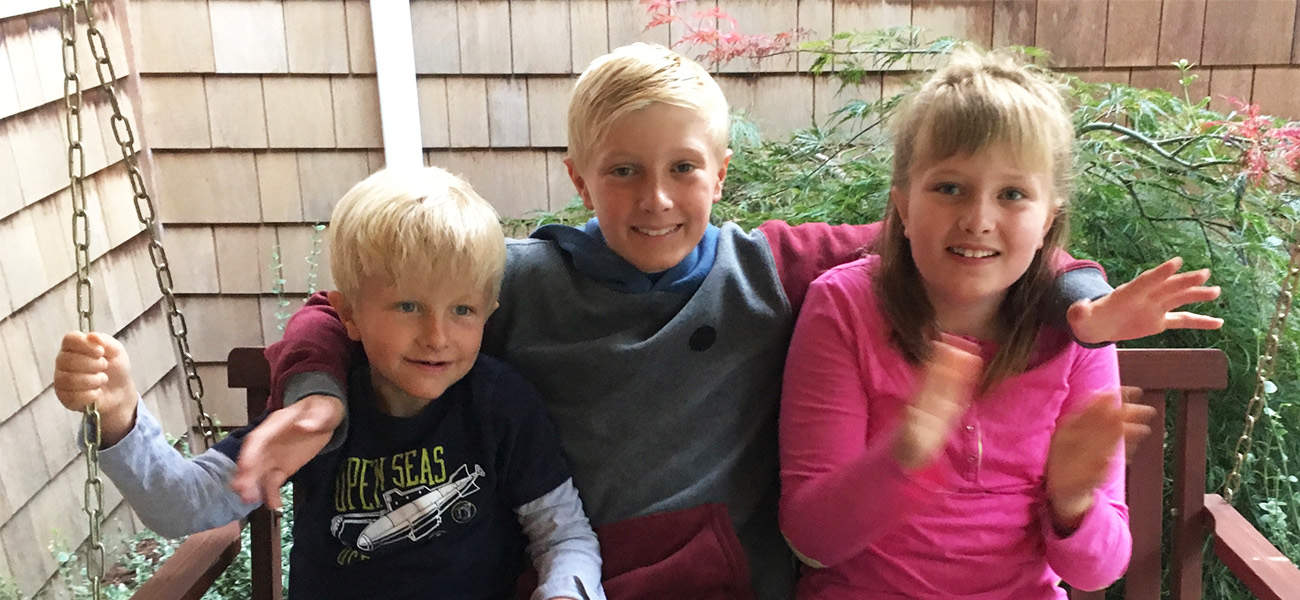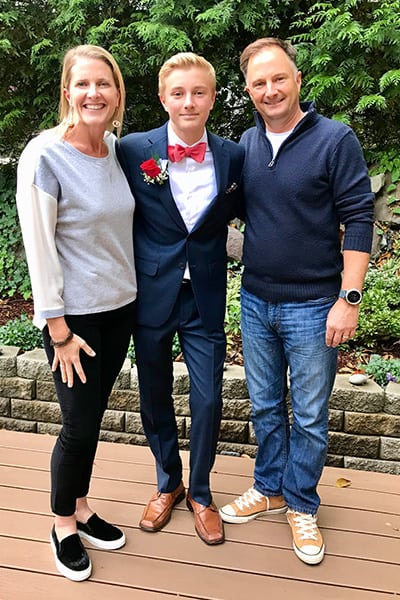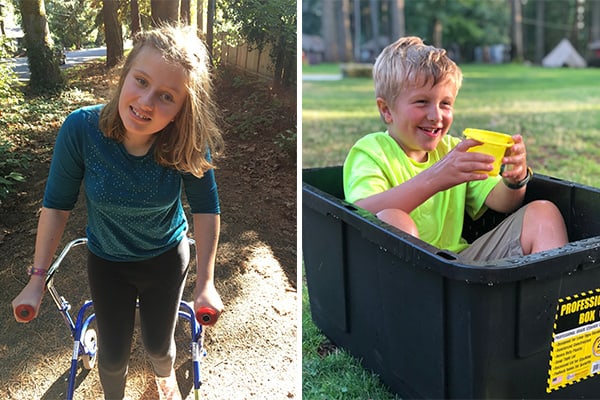
People of Jill's House:
The Hawkins Family
January 29 | 3 minute read
Meet the Hawkins
In Seattle, WA, Jill is a stay-at-home mom for her three children: Nash (14), Charlotte (13), and Cooper (8). Her husband, Doug, lovingly refers to Jill as the “COO” of the family because she keeps the family unit running on a daily basis.

Nash
Nash is the oldest of the Hawkins kids. He is described as kind, creative, adventuresome, and social, as well as an aspiring music producer. Mom says, “He’s been dealt a tough hand with regards to his sibling’s needs, but he handles it beautifully – so patient and supportive.”
Because Nash has siblings who have intellectual disabilities, he is recognized as a neurotypical sibling by the disability community. A neurotypical or “typical” sibling has no problem interacting with peers, no noticeable speech delays as children, no sensory issues, and has the ability to adapt to change.
Like most typical siblings, there is a great responsibility to care for their other siblings and getting alone time with Mom and Dad can be a rarity. One of Jill’s favorite memories with Nash, was the time she and her husband were able to take him on a vacation – just the three of them.
“He was so shocked and it felt so good to give him the attention he is often robbed of because of his siblings’ exceptional needs.”



Charlotte and Cooper
Charlotte and Cooper both have a rare genetic disease which have lead to their intellectual disability diagnosis, characteristics of autism, and countless medical issues. Before Jill had children, she worked as a school psychologist and is thankful for the ways this experience prepared her to confidently advocate for her children and their needs.
At age 13, Charlotte is spunky, determined, and hilarious. She loves dressing up, going to carnivals, swimming, and playing with animals. Although she has complicated medical issues that keep her in and out of the hospital, she approaches life in a joyful way and can always be counted on for an awesome belly laugh.
Cooper is sweet, cuddly, and nonverbal, but he has so many ways of expressing love to others. As a greeting, “he rises up on his tippy-toes, shrieks with joy, flaps his hands and makes you feel like a million bucks.” In his free time, Cooper enjoys stacking blocks, listening to music, and making smoothies.
Working through Difficulty
Not long after Cooper was born, they discovered he also had special needs similar to his sister Charlotte. They were devastated. It was a difficult time for the family to overcome, but they got through by leaning on others and re-framing the picture for their lives.
After seeking counseling, talking to loved ones, and finding new activities that the whole family could enjoy, the Hawkins family noticed joy making its way back into their everyday lives.
How to Help
The story of families like the Hawkins can be hard to understand, and many people wonder what they can do to help families raising children with intellectual disabilities.
When asked what she wishes others knew about raising her family, Jill responded: “I guess I want others to know that when you are kind we notice and are grateful. When our cumbersome and unwieldy family is being disruptive and you look at us and smile, we notice and are grateful. When you make space for our hard-to-accommodate children at your event, church, camp, etc. we feel less lonely and we thank you.”
The saying is true, a little bit of kindness goes a long way. Even family – no matter what they look like or what challenges they may be facing – can flourish within the warmth of a loving community.
Enjoy this story? Share it with your friends or read more like it!
© 2018 Jill’s House
People of Jill's House:
The Hawkins Family
January 29 | 3 minute read
Meet the Hawkins
In Seattle, WA, Jill is a stay-at-home mom for her three children: Nash (14), Charlotte (13), and Cooper (8). Her husband, Doug, lovingly refers to Jill as the “COO” of the family because she keeps the family unit running on a daily basis.



Nash
Nash is the oldest of the Hawkins kids. He is described as kind, creative, adventuresome, and social, as well as an aspiring music producer. Mom says, “He’s been dealt a tough hand with regards to his sibling’s needs, but he handles it beautifully – so patient and supportive.”
Because Nash has siblings who have intellectual disabilities, he is recognized as a neurotypical sibling by the disability community. A neurotypical or “typical” sibling has no problem interacting with peers, no noticeable speech delays as children, no sensory issues, and has the ability to adapt to change.
Like most typical siblings, there is a great responsibility to care for their other siblings and getting alone time with Mom and Dad can be a rarity. One of Jill’s favorite memories with Nash, was the time she and her husband were able to take him on a vacation – just the three of them.
“He was so shocked and it felt so good to give him the attention he is often robbed of because of his siblings’ exceptional needs.”



Charlotte and Cooper
Charlotte and Cooper both have a rare genetic disease which have lead to their intellectual disability diagnosis, characteristics of autism, and countless medical issues. Before Jill had children, she worked as a school psychologist and is thankful for the ways this experience prepared her to confidently advocate for her children and their needs.
At age 13, Charlotte is spunky, determined, and hilarious. She loves dressing up, going to carnivals, swimming, and playing with animals. Although she has complicated medical issues that keep her in and out of the hospital, she approaches life in a joyful way and can always be counted on for an awesome belly laugh.
Cooper is sweet, cuddly, and nonverbal, but he has so many ways of expressing love to others. As a greeting, “he rises up on his tippy-toes, shrieks with joy, flaps his hands and makes you feel like a million bucks.” In his free time, Cooper enjoys stacking blocks, listening to music, and making smoothies.
Working through Difficulty
Not long after Cooper was born, they discovered he also had special needs similar to his sister Charlotte. They were devastated. It was a difficult time for the family to overcome, but they got through by leaning on others and re-framing the picture for their lives.
After seeking counseling, talking to loved ones, and finding new activities that the whole family could enjoy, the Hawkins family noticed joy making its way back into their everyday lives.
How to Help
The story of families like the Hawkins can be hard to understand, and many people wonder what they can do to help families raising children with intellectual disabilities.
When asked what she wishes others knew about raising her family, Jill responded: “I guess I want others to know that when you are kind we notice and are grateful. When our cumbersome and unwieldy family is being disruptive and you look at us and smile, we notice and are grateful. When you make space for our hard-to-accommodate children at your event, church, camp, etc. we feel less lonely and we thank you.”
The saying is true, a little bit of kindness goes a long way. Even family – no matter what they look like or what challenges they may be facing – can flourish within the warmth of a loving community.
Enjoy this story? Share it with your friends or read more like it!
© 2018 Jill’s House

